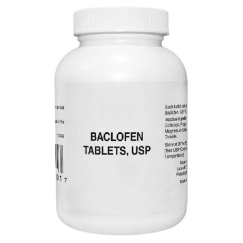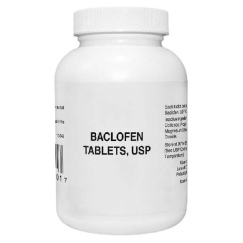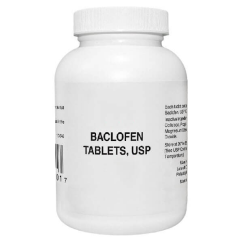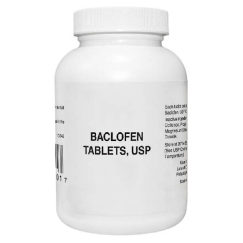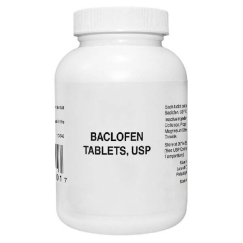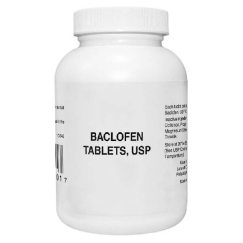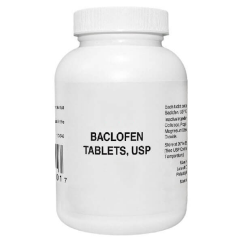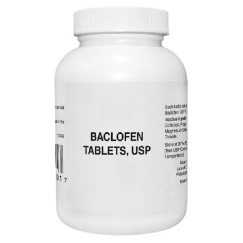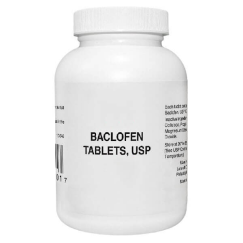What are the uses of Baclofen?
Baclofen has proved immensely useful in treating the following conditions. Your doctor might prescribe you Baclofen when you face any of the following problems.
Baclofen for Multiple Sclerosis (MS):
Baclofen has shown significant efficacy in managing muscle spasticity caused by MS. Patients with multiple sclerosis often experience involuntary muscle contractions, leading to stiffness and discomfort. Baclofen helps alleviate these symptoms, promoting better mobility and enhancing the overall quality of life for patients with MS.
Baclofen for Spinal Cord Injuries:
Patients who suffer from spinal cord injuries frequently encounter challenges related to spasticity. Baclofen's role in reducing muscle tone proves instrumental in improving motor function and minimizing the impact of spasms. This can enhance the rehabilitation process and contribute to increased independence for patients with spinal cord injuries.
Baclofen for Neurological Disorders:
Baclofen has displayed efficiency in various neurological disorders, including cerebral palsy and Amyotrophic Lateral Sclerosis (ALS). In these conditions, where muscle control is compromised, baclofen helps manage spasticity, providing relief to patients and assisting in the maintenance of functional abilities.
Baclofen off-label uses
Off-label use of Baclofen has a wide range. The continuous research to discover the drug’s capability has found some potential uses for off-label use of it. However, these uses are yet to be approved by the FDA. Let’s find out more about the interesting off-label uses of Baclofen.
Baclofen to manage Alcoholic Liver Disease
Alcohol disorder is a common and relapsing problem. When you drink excessive alcohol, it will cause you to face multiple health problems. However, the most serious impact of unlimited alcohol consumption is that it can permanently damage. The liver performs many complex yet essential functions for the body. While breaking down alcohol, it produces more harmful substances. These substances slowly destroy the functionality of the liver.
When Baclofen was tested on patients who suffered from alcoholic liver disease, the result was pleasantly surprising. The medication has shown strong efficiency in reducing alcohol consumption and preventing relapse in AUD patients affected by liver cirrhosis. Moreover, the absorption of Baclofen does not depend on liver metabolism. This is why it is considered to be a reliable medication.
Baclofen helps by Decreasing Alcohol Cravings
One of the main side effects of alcohol abuse is anxiety. When you go through the withdrawal phase and suddenly stop drinking or try to lower your consumption, you will go through psychological issues like excessive worry and fear. Baclofen helps you to maintain abstinence by lowering your anxiety.
Baclofen for Trigeminal Neuralgia
Trigeminal neuralgia is a chronic pain disorder in which you feel sudden, unprovoked facial electric shock-like pain to one side of your face. This condition primarily affects the trigeminal nerve, which provides feeling and nerve signaling to many parts of the head and face. Though it starts with short episodic pain, it can worsen into longer periods of pain. Baclofen has proved to be a useful drug when it comes to treating TN.
Baclofen for Gastroesophageal Reflux Disease
Gastroesophageal reflux disease (GERD) is a condition that happens due to the chronic retrograde reflux of acidic contents of the stomach into the esophagus with problematic symptoms or complications or both. Studies have shown that Baclofen is highly useful in the treatment of GERD. it helps action on GERD by inhibition of LES relaxation induced via vasovagal reflexes. Baclofen inhibits these reflexes through GABAB receptor activation and helps deal with GERD.
Using Baclofen for Hiccups
Hiccups are a common and irritating problem that can happen to anyone. Baclofen is a GABAB receptor agonist. It is conceivable that the reduction of dopamine release by GABAB receptor stimulation can interrupt hiccup's reflex arc. One study has revealed that oral Baclofen has remarkably helped with spasticity and improved voluntary movement in children who weigh over 15 kg.
How to take Baclofen
Baclofen tablets are taken orally. You should take the tablets by mouth with plenty of water. Do not break or chew it, unless your doctor has prescribed to do so. If your doctor prescribes to take half the tablet, save the other half. If your unused portion gets older than 28 days, do not use it anymore. When you start taking this medicine, do not stop the course suddenly. Make sure to share your updates with your healthcare team. If you forget your dose, don’t panic. Take the dose when you remember but make sure to avoid double dosing.
Intrathecal Administration:
For patients who do not respond well to oral baclofen or experience intolerable side effects, intrathecal administration can be an option to consider. This involves directly delivering baclofen into the spinal fluid via a surgically implanted pump. This method allows for precise control over the medication's distribution, offering an alternative for those who require a more targeted approach.
Whether taken orally or intrathecally, baclofen offers flexibility, allowing healthcare professionals to tailor treatment to each patient's unique needs. As research continues to uncover new facets of baclofen's potential, its role in enhancing the quality of life for individuals with neuromuscular disorders remains a subject of ongoing exploration.
Who Can Take Baclofen?
Most adults can take Baclofen unless they are allergic to it. However, children should not be given Baclofen without consulting the medical experts. The intrathecal pump can be given to adults and children who are over 4 years of age.
Where can I buy Baclofen online?
Baclofen is a trusted medication that has proved to be effective in treating muscle spasms and contractions caused by multiple sclerosis and spinal cord Injuries. You can easily buy Baclofen online on Shopemed. Shopemed offers free shipping on orders and there is no minimum order value. You can get express delivery to your doorstep and experience a truly hassle-free online delivery all across the US.
Can I Take Baclofen with Alochol ?
Baclofen is a prescription medication that primarily treats muscle spasms and contractions
This medication produces drowsiness and dizziness as side effects. Taking alcohol with Baclofen has potential risks. Since both are central nervous system depressants, they will intensify drowsiness and dizziness along with feelings of irritation, mood swings, and exhaustion.
Can Baclofen be Addictive?
Baclofen, a muscle relaxant and antispasmodic medication, is not addictive when taken in accurate doses and for appropriate reasons. The medication works on the central nervous system, specifically the spinal cord, to alleviate muscle spasms and stiffness associated with conditions such as multiple sclerosis and spinal cord injuries.
Baclofen’s mechanism works by enhancing the inhibitory neurotransmitter gamma-aminobutyric acid (GABA), which helps regulate nerve activity. While baclofen is not known to produce the euphoria or cravings typically associated with addictive substances, its abrupt discontinuation can lead to withdrawal symptoms such as hallucinations, seizures, and increased muscle spasticity. This underscores the importance of taking the medication under medical supervision to avoid adverse effects.
However, instances of baclofen misuse have been reported, especially in the context of self-medication or attempts to alleviate anxiety. Some patients may find relief from emotional distress or anxiety through the sedative effects of baclofen, leading to a potential risk of misuse. If you have a history of medications or any other form of abuse, you should not take Baclofen without talking it to your doctor or therapist.
Not only Baclofen is not addictive, but it also helps in managing the craving caused by alcohol addiction. But if you take increased doses of the drug for longer than prescribed, you might develop dependency. This means when you stop the medication, you will go through withdrawal syndrome.
What Substances may interact with Baclofen?
If you take Baclofen, with certain medications, they might interact with each other and create adverse reactions. Here is a list of certain medications that you should not take with Baclofen.
- Narcotic medications for cough
- Alcohol
- Antihistamines for allergy, cough and cold
- Certain medications for anxiety or sleep
- Certain medications for depression like amitriptyline, fluoxetine, sertraline
- Certain medications for seizures like phenobarbital, primidone
- General anesthetics like halothane, isoflurane, methoxyflurane, propofol
- Narcotic medications for pain
- Other medications that relax muscles
- Phenothiazines like chlorpromazine, mesoridazine, prochlorperazine, thioridazine

